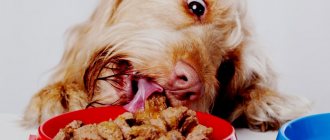The first dog in a person’s life is always responsible and a little scary. A person fears that he will not cope, will not be able to properly raise his four-legged friend, will miss the onset of some serious illness, etc. The behavior of a 2-month-old puppy can cause anxiety. The owner may think that the puppy is unhealthy, when in fact everything is fine with the baby. I suggest you figure out what you shouldn’t be afraid of, and what really should cause concern for the owner.
What not to be afraid of:
1. Puppy breathing. The puppy may breathe quickly, then the breathing may slow down, then speed up again. This is absolutely normal. 2. Puppy hiccups. Your puppy may hiccup after eating or drinking, or just during the day. Hiccups are usually normal for a small puppy and should not be ignored. 3. Puppy sneezing. Sometimes your puppy may sneeze. Sneezing is a protective mechanism that helps clear the nasopharynx. If the puppy sneezed 1-2 times a day, then this is not a sign of illness. This is normal. 4. Isolated cases of cough. Sometimes your puppy may cough. If the cough is not constant and does not produce sputum, then you should not pay attention to it. 5. When the puppy sleeps, his paws and muscles in his face and head may twitch. These are reflex muscle contractions and should not cause concern. 6. When the puppy stands up, he can arch his back and stretch his hind legs back. This puppy behavior is normal. He's just stretching to stretch his muscles. 7. Sometimes the puppy may have imperfect stool. A puppy is a living organism and cannot always produce the perfect poop. Many factors influence stool, so episodes of mushy stool are normal. 8. The puppy may vomit food immediately after eating. This is usually a signal that the puppy has eaten too much. There is no need to be afraid. 9. After regurgitating the food, the puppy may begin to eat it again. There is no need to stop the puppy from doing this. If he wants, let him eat. If the puppy is not healthy and vomits because of it, then he will never eat it again. 10. Sometimes a puppy may vomit white foam on an empty stomach. If this happened once and is not systematic, then this is not a reason to worry. 11. A female puppy may have white or yellowish discharge from the genitals at an early age. This is juvenile (puppy) vaginitis, which cannot be treated until the first heat. The owner's job is simply to keep the puppy's genital area clean. After the first heat, vaginitis usually goes away on its own. 12. After 3-4 months, a male puppy begins to develop discharge from the genitals. This occurs due to puberty and is normal. Treatment is required only if the discharge is green, it is very profuse, it makes the fur stick together and the skin turns red. 13. In a boy puppy, you can sometimes see a thickening on the genitals. This often frightens inexperienced owners. In fact, you shouldn’t be scared - it’s called a “bulb”; a male dog needs it during mating. It swells when blood rushes to the genital organ. And then she disappears. 14. Sometimes the puppy may itch with its back paw and seem to be biting something with its teeth. If the puppy does this a couple of times a day, not often and without obsessing over the process, then this is the norm. People get itchy too sometimes. 15. A small amount of clear liquid, like tears, may be released from the eyes of a 2-3 month old puppy. This is a common phenomenon. If the discharge looks like tears, there is not a lot of it, and it does not flow constantly, then this is normal. 16. Sometimes you may notice that your puppy has a little brown discharge in his ears. If this does not happen every day, there is not a lot of discharge, there is no strong odor from the ears, the skin inside the ears is not red, and the puppy is not obsessed with scratching his ears, then there is no need to worry. This is the norm. You just need to clean your ears with a special lotion or hydrogen peroxide. 17. A small puppy can pee every 20 minutes and poop up to 10 times a day. This is the age norm. 18. The puppy may whine sometimes. This is not a sign of illness. 19. The puppy can lie down with its hind legs extended back. This is an absolutely normal, healthy position for a puppy, as well as for an adult dog. This position indicates the health of the joints, as well as the comfortable state of the dog. 20. Sometimes the puppy may fart and burp. His stomach may growl. By themselves, these symptoms mean nothing if they are not regular and are not accompanied by other, more dangerous symptoms. 21. It is normal for a puppy to have a dry and warm nose. Some people believe that a dog’s nose is always wet, and it becomes dry due to illness. This is wrong. The nose can be dry during sleep, after active games, due to thirst, due to heat, or for generally unknown reasons. A warm, dry nose in itself is not a sign of illness or a cause for alarm. 22. Dark spots often appear on the puppy’s tummy. This is pigmentation that is completely normal and occurs in almost all dogs.
What should cause concern:
1. Vomiting food more than 3 times a day. 2. Diarrhea is watery or mucous. Mushy diarrhea that occurs for more than 2 days in a row. 3. Vomiting white or yellow foam every morning or several times during the day. 4. Green, foul-smelling discharge from the dog’s genitals, causing sticky fur and redness. 5. Temperature rise above 39 degrees. 6. Pimples on the body, scratching, sores. 7. Severe itching, which is manifested by constant scratching of any area of the body. 8. Purulent discharge from the eyes or nose. 9. A lot of brown discharge in the ears, especially accompanied by a pungent odor and itching. 10. Refusal to eat for more than a day, accompanied by lethargy and drowsiness. 11. Cough several times a day. Expectoration of mucus. 12. Sudden onset of lameness. 13. Any change in the dog's behavior. 14. Swelling from insect bites.
When you need to urgently go to the doctor:
1. Diarrhea in the form of water shooting out with pressure. 2. Diarrhea with blood more than 2 times. Especially if you have a puppy of 2-4 months. 3. Repeated, frequent vomiting. 4. Urine is red or brown. 5. Cough as if the dog was choking. Or a cough with a lot of sputum, accompanied by a general deterioration of the condition. 6. Lack of feces for 2 days, accompanied by lethargy of the dog. 7. Sudden enlargement of the abdomen. Especially when accompanied by increased breathing and weakness. 8. Bloody discharge from the genitals of a male or female dog out of heat. 9. Temperature rise above 40 degrees. 10. Cramps. 11. Loss of consciousness. 12. Swelling of the muzzle and tongue.
Causes of illness
Gastrointestinal disorders in pets occur for various reasons, but most often diarrhea occurs due to errors in the dog’s diet. The most common causes of digestive dysfunction are:
- Binge eating. In the wild, it’s not every day that a family of canines manages to catch their prey, but when the hunt is successful, the animals eat to their heart’s content. Domestic dogs also do not know a sense of proportion and, having grabbed a large amount of food, tend to eat in reserve.
- Incorrectly formulated diet.
- Acute gastric dilatation in dogs.
- A sudden change of food, for example, from dry to natural and vice versa.
- Poisoning with medications, poisons.
- Gastric ulcers in dogs.
- Intoxication caused by eating spoiled food.
- Helminthiasis.
- Indigestion.
- Bacterial and viral infections, including those that are fatal to the pet’s life.
- Foreign body in the dog's stomach. When swallowing any inedible object, the mucous membranes of the stomach and intestines are severely injured.
- Intestinal dysbiosis.
- Allergy.
- Gastric volvulus in dogs.
- Cancerous tumors in the gastrointestinal tract. A seemingly harmless digestive disorder such as diarrhea may indicate that your pet is developing cancer of the stomach or intestines.
- Duodenitis (inflammation of the duodenum).
Often, indigestion is observed in puppies after the animals are transferred from mother's milk to another food. For a puppy, diarrhea is considered very dangerous, since the dog’s fragile body is not yet able to fight various infections that attack young animals during diarrhea.
Diarrhea is often the result of stress. Moving to another place, a change or death of the owner, the appearance of other animals in the house - all this can provoke an upset stomach in a dog.
Upset stomach as a symptom
Common signs of indigestion in dogs are lack of appetite, vomiting, diarrhea, gas, and general weakness, but the causes of this condition can vary. About 20 years ago there was a very popular humor about a doctor who said to all his patients, regardless of the symptoms they described to him: “You ate something!”
Infections
Some dog owners argue in the same way, not suspecting that gastrointestinal disorders can be a sign of infectious diseases (intestinal plague, parvovirus enteritis, viral hepatitis, leptospirosis), as well as pathologies of the liver, kidneys, pancreas and even heart.
Poisoning
Acute diarrhea and painful, non-stop vomiting are characterized by toxic infections, that is, poisoning. In this case, there is a risk not only to the health, but also to the life of the dog, so it is very important to consult a doctor immediately, without hoping that it will go away on its own. At the clinic, the animal will be detoxicated using IVs, and under no circumstances should you abandon this time-consuming and rather expensive procedure, as some owners do.
Long-term intoxication is dangerous, as it disrupts the functioning of all organs and systems of the body. The stingy pays twice, and you will still have to pay for long-term treatment for diseases of the liver, kidneys and pancreas.
So, if indigestion is associated with infectious diseases or poisoning, then the only way to cope with it is treatment as prescribed by a doctor, and experiments with changing food are useless.
Symptoms
Dyspepsia can be caused by a cause that does not cause significant harm to the dog's body. But some diseases that are dangerous to a pet’s health sometimes have no signs other than diarrhea, so it is difficult to recognize that a pet is infected with a serious illness.
Each disease that causes indigestion is characterized by certain symptoms, but there are also general symptoms of indigestion:
- increased salivation;
- severe and frequent vomiting;
- increased body temperature;
- lethargy, weakness, refusal to eat;
- constant lying of the animal on its side;
- diarrhea (may contain impurities of mucus, blood, food debris).
As a rule, the appearance and consistency of excrement can be used to judge whether a dog has a disease. Diarrhea mixed with blood indicates the development of an infectious disease, damage to the walls of the stomach and intestines, and poisoning with potent poisons.
White feces indicate liver pathologies, green feces are a sign of distemper, yellow or gray watery stools are a clear symptom of parvovirus enteritis.
Black diarrhea should prompt a dog owner to seek veterinary attention immediately, as black stools can be a sign of internal bleeding.
Often, due to improper feeding, stomach ulcers develop in dogs. Frequent changes of food, low-quality food, alternating hot and cold dishes given to the dog, stress, taking medications, diseases of the internal organs - all this can provoke the formation of erosions on the walls of the stomach. Symptoms of ulcers are:
- Vomit. The masses ejected by the stomach are usually dark in color and sometimes contain blood. Vomiting attacks occur very often and do not bring any relief to the pet.
- Diarrhea. Diarrhea begins to accompany the dog constantly, while the feces are liquid, black, and look like tar.
- Lethargy, apathy. The animal increasingly prefers to lie down and refuses to play.
- Loss of interest in food, increased urine volume, fever, extreme thirst, heavy breathing.
Only a veterinarian can determine the exact cause of stomach upset. As a rule, a clinical examination and history taking are not enough to make a diagnosis, so the doctor prescribes additional tests for the dog:
- Analysis of animal feces for the presence of parasites in its body.
- General urine and blood tests.
- Radiography.
- CT scan.
- Ultrasonography.
- Endoscopy.
Only on the basis of a comprehensive examination can an accurate conclusion be made about the disease and an effective treatment regimen be prescribed.
Domestic dogs may have nervous overeating
Not long ago, the Journal of Veterinary Behavior published a study by Dr. Franklin McMillan, who is confident that overeating in dogs often has exactly the same nervous nature as in humans.
According to Dr. McMillan, dogs, like people, eat away at stress, anxiety, depression and general boredom.
At the same time, in his research, Dr. McMillon relies on quite a lot of previous research that has shown that overeating in dogs is often emotional in nature.
And if so, then in order to rid the dog of the tendency to overeat, it is necessary to eliminate all negative mental factors from its life, and only then take away the bowl of food. Otherwise, the dog will become even more stressed and become even more seriously ill.
Treatment methods
Treatment for indigestion depends on the severity of the pathology, because the sooner the owner of the animal paid attention to the signs that his dog had developed, the easier and faster the animal will recover. It is important to understand that only mild digestive disorders can be cured at home; chronic diarrhea and vomiting require identifying and eliminating the cause that caused them.
The first thing you need to do is deal with diarrhea. The best option would be to limit the amount of food your dog eats or change its diet. The pet is fed viscous rice porridge (it has an enveloping effect); you can introduce fermented milk products into the diet, which will help normalize the intestinal microflora. If vomiting occurs frequently, the animal is given antispasmodic drugs and activated charcoal.
For home remedies, you can use infusions and decoctions of medicinal herbs (nettle, chamomile, sage), which have antibacterial and astringent properties. If there are no medicinal herbs in the home medicine cabinet, the dog is allowed to use human medications:
- Enterofuril - effectively fights diarrhea caused by intestinal infections.
- Levomycetin 250 is destructive for most pathogenic microflora developing in the digestive organs.
- Smecta is a powder soluble in water. It copes well with mild poisoning and quickly relieves intoxication.
- Furazolidone - helps only with intestinal dysbiosis.
If the animal is poisoned and the result of intoxication is diarrhea, you can rinse the dog’s stomach. The procedure will require warm water with soda, a syringe without a needle or a rubber bulb. The liquid is slowly poured into the animal’s mouth, carefully making sure that the pet does not accidentally choke.
The dog's stomach is lavaged until vomiting begins. As soon as the vomit becomes clear and watery, the procedure can be considered complete.
Stomach ulcers in dogs require only medical intervention; it is impossible to rid your dog of the disease on your own. The doctor will prescribe the following medications to the animal:
- Omeprazole, Cimetidine - reduce the production of hydrochloric acid in the stomach;
- Sucrat, Sucralfate – have adsorbent and antacid properties;
- intravenous drips to restore water and electrolyte balance;
- use of antibiotics – fights bacterial infection in the stomach.
Prevention
It is possible to prevent stomach upset in dogs if you follow simple rules for caring for your animal:
- Feed your pet only high-quality and fresh food.
- Regularly carry out vaccinations and deworming.
- Make sure your dog doesn't swallow an inedible object.
- Try to visit the veterinarian in a timely manner to identify and treat various diseases.
- In case of poisoning, it is necessary to rinse the dog’s stomach.
Despite the fact that indigestion is a fairly common problem in dogs, it is necessary to combat it. It is important to understand that the animal experiences severe discomfort and sometimes excruciating pain due to diseases of the digestive system.
Do you want to know more about the article or something? Call +79774692712, we will advise you.
Hello, dear readers of the blog, I congratulate you on the upcoming New Year, Christmas and Epiphany, this is a wholesale greeting










